UpHealth Bundle
How is UpHealth Navigating the Digital Health Market?
UpHealth, a digital health pioneer, has dramatically reshaped its UpHealth SWOT Analysis and go-to-market strategy since its 2019 launch. This strategic pivot, focusing on its profitable behavioral health solutions, begs the question: How is UpHealth adapting its Sales strategy and Marketing strategy to thrive in the rapidly expanding healthcare technology landscape? Understanding UpHealth's approach is crucial for anyone tracking the digital health sector.
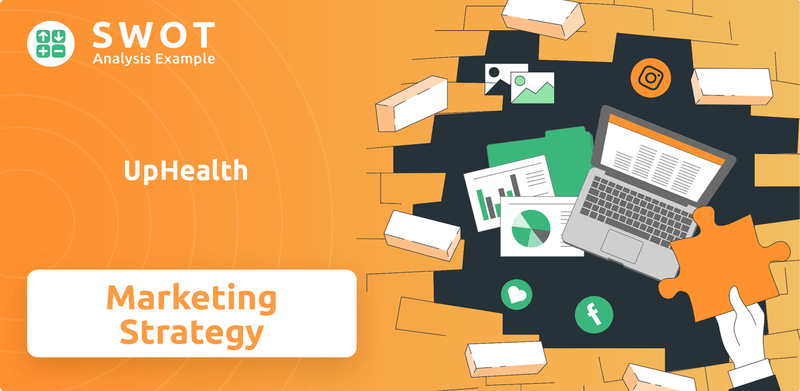
As the digital health market explodes, with telehealth and care management solutions experiencing massive growth, UpHealth's success hinges on its ability to effectively reach its target market. This analysis delves into UpHealth's current strategies, examining its sales process overview, digital marketing strategy, and customer relationship management. We'll explore how UpHealth acquires customers, its marketing campaigns examples, and its competitive analysis to understand its position and future marketing plans within the industry.
How Does UpHealth Reach Its Customers?
The sales channels for UpHealth are primarily driven by a direct sales force. This approach allows for tailored engagement with key clients. UpHealth also leverages strategic collaborations to expand its reach, particularly with payers, including health plans and third-party administrators. This is a key component of their overall sales strategy.
UpHealth also engages with public entities, such as the U.S. Departments of Veterans Affairs and other federal, state, and local healthcare agencies. This governmental sales approach requires specialized knowledge of public sector procurement processes and regulations. Following the divestiture of its Virtual Care Infrastructure and Integrated Care Management platforms in early 2024, the company has focused on its profitable TTC behavioral healthcare business.
The emphasis on direct sales and strategic partnerships with payers and public entities indicates their perceived effectiveness in reaching the target market for behavioral health solutions. While specific performance metrics for each channel are not publicly detailed for 2024-2025, the current marketing strategy seems centered on these key areas. Understanding the sales strategy is crucial in assessing the company's potential. For more context, you can explore the Competitors Landscape of UpHealth.
UpHealth utilizes a direct sales force to engage with key clients. This allows for building strong relationships and tailoring engagement to specific needs. This approach is crucial for the company's go-to-market strategy.
Strategic collaborations, especially with payers, are a key channel for expanding reach. These partnerships are essential for accessing a broader customer base. This is a significant part of their digital health approach.
UpHealth engages with public entities, including the U.S. Department of Veterans Affairs. This channel requires specialized knowledge of public sector procurement. This approach is a key part of their healthcare technology sales.
Following the divestiture of certain platforms, UpHealth is now focused on its profitable TTC behavioral healthcare business. This strategic shift highlights the importance of these sales channels. This focus is a key part of their UpHealth strategy.
UpHealth's sales channels are primarily focused on direct sales, strategic collaborations, and governmental sales. This targeted approach is designed to maximize reach within the behavioral health market. The UpHealth sales and marketing approach is centered on these key channels.
- Direct Sales: Building relationships with key clients.
- Strategic Partnerships: Collaborating with payers to expand reach.
- Governmental Sales: Targeting public entities like the VA.
- Focus on Behavioral Health: Prioritizing profitable business areas.
UpHealth SWOT Analysis
- Complete SWOT Breakdown
- Fully Customizable
- Editable in Excel & Word
- Professional Formatting
- Investor-Ready Format
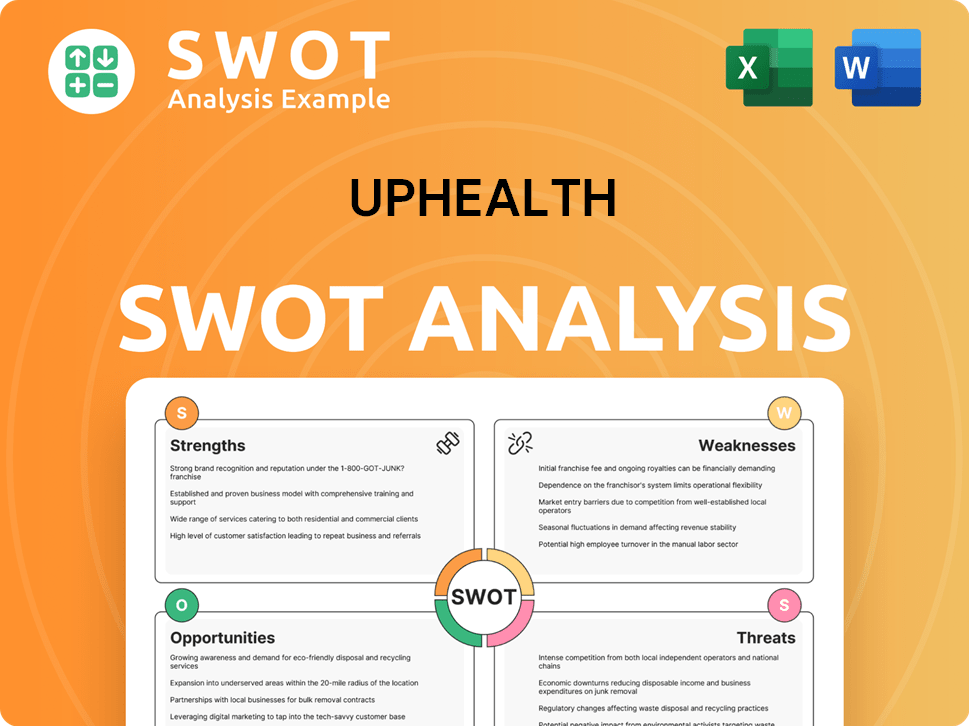
What Marketing Tactics Does UpHealth Use?
The marketing tactics employed by UpHealth, especially with its focus on behavioral health via TTC Healthcare, likely center on digital strategies. These are essential for building brand awareness, generating leads, and driving sales within the healthcare technology sector. A strong Growth Strategy of UpHealth would likely incorporate these tactics.
Given the trends in healthcare marketing for 2025, UpHealth probably utilizes content marketing to educate potential clients. This includes payers, providers, and government agencies about the benefits of its digital health solutions. The emphasis is on improved patient outcomes and cost efficiencies, especially considering the rising prevalence of chronic diseases and the need for continuous monitoring.
SEO and paid advertising on platforms like Google and social media are crucial for increasing visibility and attracting high-intent traffic from organizations seeking digital health solutions. The healthcare industry is increasingly adopting AI for personalized patient experiences and optimized marketing campaigns, suggesting UpHealth may leverage AI-powered tools for audience segmentation, predictive analytics, and content recommendations to enhance its outreach efforts.
Content marketing is likely a cornerstone, using white papers, case studies, and webinars to educate potential clients. This approach aligns with the need to demonstrate value and efficacy in the competitive digital health market.
SEO and paid advertising on platforms like Google and social media are crucial for increasing visibility. These strategies are designed to attract high-intent traffic from organizations looking for digital health solutions.
The use of AI for audience segmentation and predictive analytics is becoming increasingly common. This helps to optimize marketing campaigns and personalize patient experiences.
Email marketing is essential for nurturing leads and maintaining engagement. Segmented lists and personalized communications are key to effective outreach.
Participation in industry events and conferences is vital for direct engagement and relationship building. This is particularly important in a B2B environment.
A data-driven approach is expected, using analytics tools to measure campaign performance. This informs strategic adjustments and ensures a better ROI and patient acquisition.
UpHealth's marketing strategy likely focuses on a blend of digital and traditional tactics, tailored to the healthcare technology market. The goal is to enhance the sales strategy and overall marketing strategy.
- Content marketing, including white papers and webinars, to educate clients.
- SEO and paid advertising to increase visibility and attract potential customers.
- AI-powered tools for audience segmentation and campaign optimization.
- Email marketing for lead nurturing and engagement.
- Participation in industry events for relationship building.
- Data analytics to measure performance and refine strategies.
UpHealth PESTLE Analysis
- Covers All 6 PESTLE Categories
- No Research Needed – Save Hours of Work
- Built by Experts, Trusted by Consultants
- Instant Download, Ready to Use
- 100% Editable, Fully Customizable
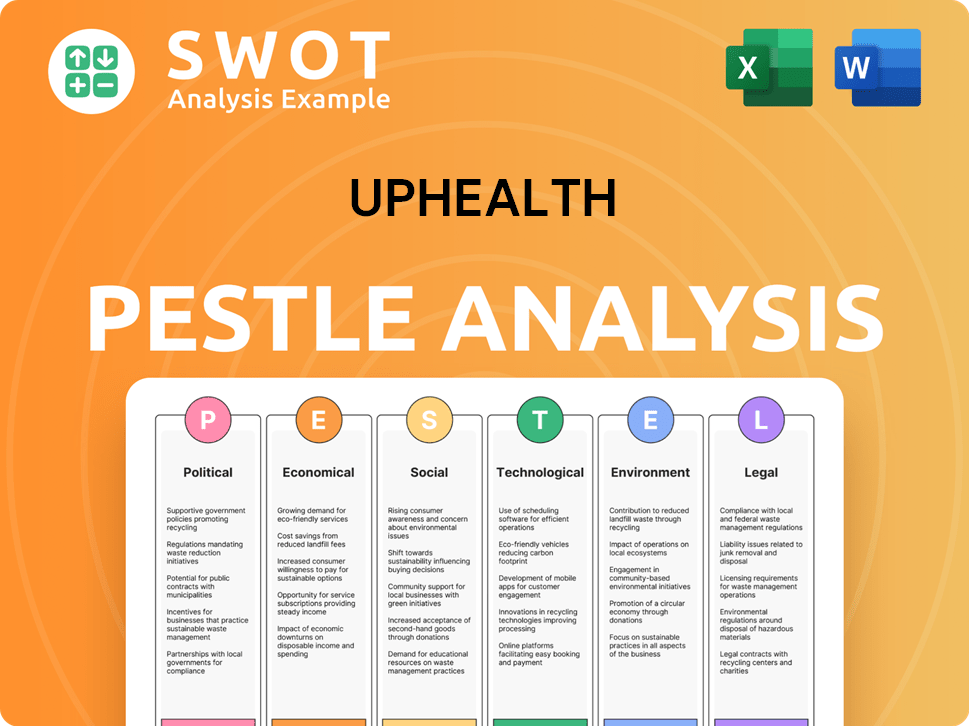
How Is UpHealth Positioned in the Market?
Following its strategic shift, the brand positioning of UpHealth centers on being a prominent provider of comprehensive behavioral health solutions. This approach differentiates the company by focusing on a specialized, in-depth area within the broader digital health landscape. The core message likely emphasizes high-quality, affordable, and accessible behavioral healthcare through evidence-based treatments and services. This resonates with the increasing demand for remote and cost-effective healthcare solutions, especially in the growing telehealth market.
The visual identity and tone of voice would likely convey professionalism, trustworthiness, and empathy, which are crucial in the sensitive field of behavioral health. UpHealth aims to appeal to its target audience—healthcare providers, payers, and public entities—by promising improved patient outcomes and reduced healthcare costs through its integrated care management solutions. The company's recent legal victories, such as the arbitration award against Glocal Healthcare Systems, could also contribute to building investor confidence and reinforcing its credibility in the market. Brand consistency across various touchpoints, including direct sales interactions and digital presence, would be paramount to reinforce this specialized and reliable image.
In a dynamic healthcare environment, UpHealth would need to continuously monitor shifts in consumer sentiment and competitive threats, potentially adapting its messaging to highlight its unique selling propositions in the evolving behavioral health sector. For example, the telehealth market is projected to reach $78.7 billion by 2028, according to a report by Grand View Research, highlighting the growth potential for companies like UpHealth. The company's focus on behavioral health aligns with the increasing need for mental health services, with the global mental health market valued at $399.4 billion in 2022, as reported by Fortune Business Insights, and expected to reach $537.97 billion by 2030. A Brief History of UpHealth provides context on its evolution and strategic direction.
The sales strategy likely involves direct sales to healthcare providers, payers, and public entities. This includes building relationships, demonstrating the value of integrated care management solutions, and showcasing improved patient outcomes and cost savings. The sales team structure would be crucial for effective outreach and relationship management.
The marketing strategy would likely focus on digital marketing, content marketing, and public relations to build brand awareness and generate leads. Content marketing, such as white papers and webinars, could educate potential customers about the benefits of behavioral health solutions. Targeted campaigns would be essential to reach specific customer segments.
UpHealth's target market includes healthcare providers, payers, and public entities seeking to improve patient outcomes and reduce healthcare costs. These entities are looking for integrated care management solutions that are evidence-based and accessible. Understanding the needs of these customers is crucial for effective sales and marketing.
Customer acquisition involves a combination of direct sales efforts, digital marketing campaigns, and content marketing initiatives. Building relationships with key decision-makers and demonstrating the value proposition of UpHealth's solutions are crucial for acquiring new customers. The company's sales process overview would outline the steps involved in converting leads into customers.
The digital marketing strategy would likely encompass SEO, social media marketing, and targeted advertising to reach potential customers. The focus would be on promoting the benefits of UpHealth's solutions and generating leads. The digital marketing strategy should align with the overall sales and marketing goals.
The sales team structure would likely include sales representatives, account managers, and potentially sales leadership roles. The structure should support effective outreach, relationship management, and customer acquisition. The sales team's performance would be measured using key performance indicators (KPIs).
The revenue model would likely be based on subscription fees, service fees, or a combination of both. The pricing strategy should reflect the value of the integrated care management solutions and the cost savings they provide. Understanding the revenue model is crucial for financial planning.
The marketing budget allocation should be based on the overall marketing strategy and the goals of the company. The budget should be allocated across various marketing channels, such as digital marketing, content marketing, and public relations. The marketing budget allocation should be reviewed and adjusted regularly.
Customer relationship management (CRM) is essential for managing customer interactions and tracking sales activities. A CRM system helps the sales and marketing teams stay organized and improve customer relationships. Effective CRM practices can lead to increased customer satisfaction and retention.
The sales and marketing challenges could include competition, market access, and regulatory hurdles. Overcoming these challenges requires a well-defined strategy, a strong sales team, and effective marketing campaigns. Adapting to changes in the healthcare landscape is crucial.
UpHealth Business Model Canvas
- Complete 9-Block Business Model Canvas
- Effortlessly Communicate Your Business Strategy
- Investor-Ready BMC Format
- 100% Editable and Customizable
- Clear and Structured Layout
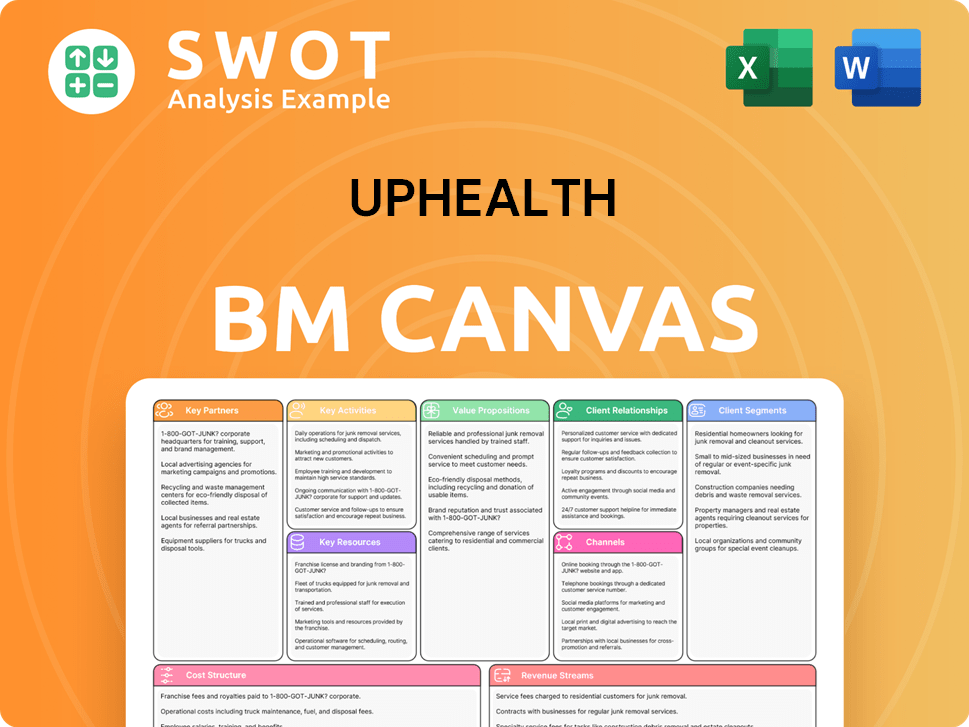
What Are UpHealth’s Most Notable Campaigns?
The focus of the company's sales and marketing efforts centers on its behavioral healthcare business, especially its TTC segment. The sales strategy and marketing strategy for UpHealth are highly targeted, emphasizing relationship-driven approaches rather than broad consumer-facing campaigns. This approach aligns with the company's strategic shift towards direct sales and collaborations with payers and public entities.
Key campaigns for UpHealth are designed to attract and retain clients within the behavioral healthcare sector. These campaigns are geared towards showcasing the quality of care, regulatory compliance, and efficient operations of the TTC business. The company's sales and marketing approach is therefore built around building partnerships and expanding its market reach.
A significant aspect of UpHealth's sales strategy has been its 'simplification strategy,' which involved the sale of its Cloudbreak Health business in March 2024 for $180 million. This strategic move was aimed at reducing debt and providing financial flexibility. The success of this initiative is measured by the significant debt reduction, including the full payment of its $115 million 2026 notes and a substantial portion of its $57.2 million 2025 notes.
Future campaigns will likely highlight the high-quality care, regulatory compliance, and operational efficiency of the TTC behavioral healthcare business. These efforts aim to attract new partnerships and joint ventures. The goal is to facilitate geographic and service line expansion within the behavioral health ecosystem.
Content marketing will likely include evidence-based treatments and thought leadership in behavioral health. The company may also use direct outreach programs to healthcare systems and government agencies. Any collaborations will likely be with other healthcare providers or technology platforms.
The company's go-to-market strategy emphasizes building partnerships with healthcare providers and technology platforms. These partnerships are designed to enhance service delivery and expand reach. This approach supports the company's long-term growth plans.
The sale of Cloudbreak Health for $180 million in March 2024 was a key strategic move. This action helped de-lever the balance sheet. The company used the proceeds to pay off significant debt obligations.
UpHealth's sales and marketing efforts are focused on the behavioral healthcare sector, particularly its TTC business. The company's approach involves targeted campaigns aimed at attracting and retaining clients. The sales strategy emphasizes building relationships and partnerships within the healthcare industry.
- Focus on high-quality care, regulatory compliance, and efficient operations.
- Content marketing highlighting evidence-based treatments and thought leadership.
- Direct outreach to healthcare systems and government agencies.
- Strategic collaborations with other healthcare providers and technology platforms.
- Emphasis on geographic and service line expansion.
For more insights into the financial aspects of UpHealth, including its revenue streams and business model, you can refer to Revenue Streams & Business Model of UpHealth.
UpHealth Porter's Five Forces Analysis
- Covers All 5 Competitive Forces in Detail
- Structured for Consultants, Students, and Founders
- 100% Editable in Microsoft Word & Excel
- Instant Digital Download – Use Immediately
- Compatible with Mac & PC – Fully Unlocked
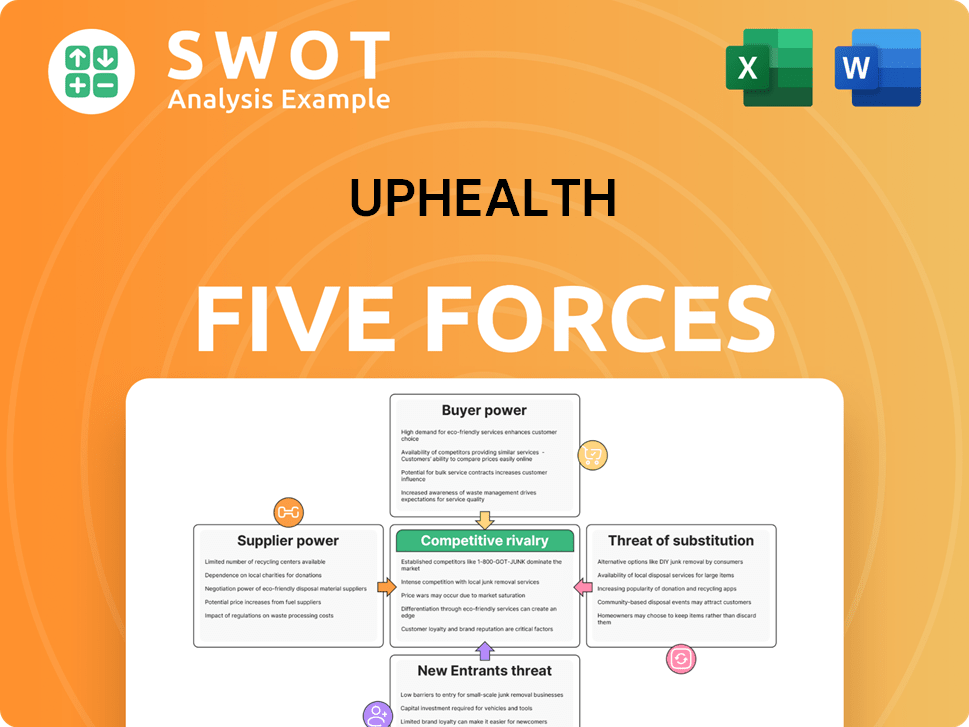
Related Blogs
- What are Mission Vision & Core Values of UpHealth Company?
- What is Competitive Landscape of UpHealth Company?
- What is Growth Strategy and Future Prospects of UpHealth Company?
- How Does UpHealth Company Work?
- What is Brief History of UpHealth Company?
- Who Owns UpHealth Company?
- What is Customer Demographics and Target Market of UpHealth Company?
Disclaimer
All information, articles, and product details provided on this website are for general informational and educational purposes only. We do not claim any ownership over, nor do we intend to infringe upon, any trademarks, copyrights, logos, brand names, or other intellectual property mentioned or depicted on this site. Such intellectual property remains the property of its respective owners, and any references here are made solely for identification or informational purposes, without implying any affiliation, endorsement, or partnership.
We make no representations or warranties, express or implied, regarding the accuracy, completeness, or suitability of any content or products presented. Nothing on this website should be construed as legal, tax, investment, financial, medical, or other professional advice. In addition, no part of this site—including articles or product references—constitutes a solicitation, recommendation, endorsement, advertisement, or offer to buy or sell any securities, franchises, or other financial instruments, particularly in jurisdictions where such activity would be unlawful.
All content is of a general nature and may not address the specific circumstances of any individual or entity. It is not a substitute for professional advice or services. Any actions you take based on the information provided here are strictly at your own risk. You accept full responsibility for any decisions or outcomes arising from your use of this website and agree to release us from any liability in connection with your use of, or reliance upon, the content or products found herein.